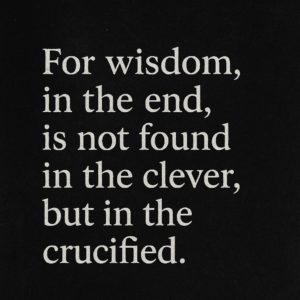“Wisdom has built her house; she has carved its seven columns.”
—Proverbs 9:1
“But the wisdom from above is first pure, then peace-loving, gentle, compliant, full of mercy and good fruits, unwavering, without pretense.”
—James 3:17
 This past weekend at church, our pastor spoke on Proverbs 9. I haven’t stopped thinking about it.
This past weekend at church, our pastor spoke on Proverbs 9. I haven’t stopped thinking about it.
We often treat wisdom like a mental game—something to outthink others with or win arguments through.
But the Bible paints a far deeper, more dangerous picture.
Wisdom, in Scripture, isn’t about being clever—it’s about being close to the heart of God.
It doesn’t begin with strategy or intellect, but with reverence:
“The fear of the Lord is the beginning of wisdom.”
And here’s the heartbeat of this post:
“True wisdom is not the art of being right, but the grace of being righteous.
It does not assert itself—it aligns itself with the heart of God.
For wisdom, in the end, is not found in the clever, but in the crucified.”
That’s not a slogan. That’s the soil where Proverbs 8 and 9 and James 3:17 grow its roots.
Wisdom as a Way of Being
In Proverbs, Wisdom is not an abstract principle. She is personified—a woman who builds a house, carves out seven pillars, sets a table, and invites the humble to come in. Her life is described as just, prudent, joyful, and rooted in creation itself.
In James, we’re given a lens for this kind of wisdom: it’s pure, peace-loving, gentle, submissive, full of mercy and good fruit, impartial, and sincere.
You won’t find it necessarily trending on X (formerly known as Twitter).
You’ll find it in a heart that refuses to dominate, manipulate, or perform.
The Seven Pillars May Not Be Listed—But They’re Lived
Some scholars have tried to “name” the seven pillars of wisdom in Proverbs 9. But maybe they’re not meant to be a checklist. Maybe they’re meant to be a way of life—a framework for people who bear the image of Christ.
When we read James 3:17, we don’t just see a list of virtues—we see a portrait of Jesus.
This is the kind of wisdom that can build something eternal.
It’s stable. Strong. And safe.
What Kind of Wisdom Am I Known For?
There are many who can teach theology, lead meetings, and manage systems. But few who carry wisdom that brings rest to the soul. Wisdom that doesn’t just answer the question—but heals the wound behind it.
And this is where it gets real for me:
I don’t want to be known for how right I am.
I want to be known for how wisely I love.
Because Christ Himself became for us wisdom from God (1 Cor. 1:30)—and He did it not with force, but with cruciform grace.
Reflection Prompt:
-
Is the wisdom I’m operating in making me more gentle, or more guarded?
-
Do people feel safe or silenced around me?
-
Am I building with heaven’s tools—or with noise that only masquerades as wisdom?

